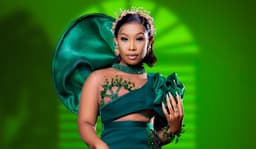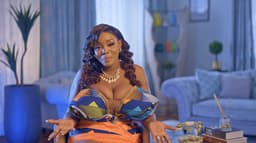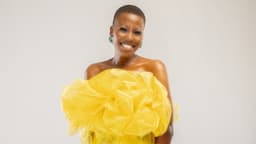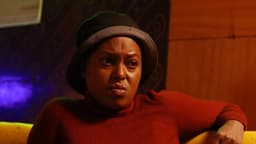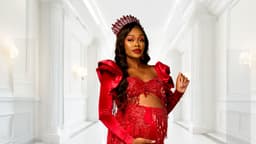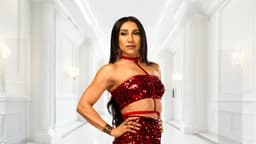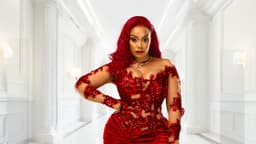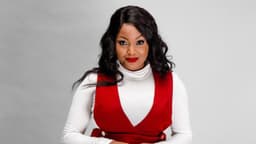
Would you join The American Society of Magical Negroes?
Once upon a time in Hollywood, director Spike Lee described a certain type of supporting character whose sneakiness rivalled that of the Manic Pixie Dream Girl. This character was always Black, and their only goal in the movie was to use their unique insights and skills, like Chubbs (Carl Weathers) in Happy Gilmore, or even their literal magical powers – like God (Morgan Freeman) in Evan Almighty – for the sole purpose of helping the movie’s white hero or heroine to learn that lesson, capture that heart, fix that marriage, solve that mystery, become less racist, or just grow as a person, you know?
Spike Lee dubbed them the Magical Negro. And now, at last, they’re getting the spotlight to themselves in Kobi Libii’s satirical comedy The American Society of Magical Negroes.

“While it’s certainly not the only problematic stock character in movie history, the symbolism of the Magical Negro has always been particularly troubling to me,” says Kobi (who played Rob Olive in Younger, and Kobi in Girls). “Black people only have worth inasmuch as we’re making a white protagonist’s life more colorful or meaningful; we don’t have value on our own. There’s a dark reflection of our society's broader values here: Black lives don’t always matter. And while the trope itself is certainly worthy of criticism, the real question I’m interested in is what does living in a society that has those values do to you? What has it done to me?”
What if being a Magical Negro was a real job?

“The premise of the satire is pretty simple: What if being a Magical Negro was a real job? What if your whole Black existence were consumed by prioritising white people and white comfort? What if you just got up every morning, and focused on being the version of yourself that fit into a white world and served every white person’s story?
“Obviously, this is absurd; exaggerated to make the film a comedy. Obviously, this is not something we do. But if I’m honest. Really honest. More honest than I’m comfortable being: I relate to the Magical Negroes’ job description.
“One thing this society taught me was to assimilate. Teachers encouraged me to code switch. I did. They controlled my grades, my future. My father taught me to be incredibly nice and non-threatening in any interaction with the police. He, having spent three formative years in an America where lynchings still occurred, made the urgency of the matter harrowingly clear; don’t worry about your pride, just make the powerful white person comfortable. Like a good A-student, I over-learned these lessons. And, for years, had internalised a relationship to white people that was too deferential. On some level, I believed this was necessary to stay alive.”
This is personally embarrassing

“As you can imagine, this is not the proudest thing to admit – everyone would rather look in the mirror and see a powerful Black Revolutionary. And I can’t stress enough how much I’m speaking for myself here, not All Black People Everywhere. But if I’m honest, really honest, this was a part of my particular response to racism.
“While this is personally embarrassing, it is also, I believe, a savage indictment of America. That, as a Black person, I did not feel that being myself – uninhibited, fully expressed – gave me the best chance to thrive, or even survive. That I was discouraged, by a sweeping, insidious culture, that makes things like Magical Negro movies over and over again, from prioritising my own happiness as much as that of the white people around me.”
Who gets to be the main character?

“The question here is this: who gets to be the main character? Not just in movies, but in American life more broadly. Who’s comfort and safety are prioritised and whose aren’t? Whose lives are assumed to matter and whose require marches and movements to protect? Is Aren (my film’s Black protagonist, played by Justice Smith) doomed to be the soulful sidekick (peripheral, even expendable) or will it become his story with his wants and feelings central? To put it in movie terms, will he be the one who ‘gets the girl’?
“This film is my attempt to process all of this. It’s a fantasy because strict reality can’t possibly reflect the creative, fantastical things Black people have to do to survive in America. It’s a comedy because the shame of this defense mechanism is so radioactive that I have to laugh to make an honest conversation about it bearable. And it’s a love story because, to me, being seen and appreciated by someone you love is the opposite of a society that tells you your life doesn’t matter.”
PS: if you are “the girl” thinking, “Hey, Kobi, why is it my job to make your life matter?” keep watching to the end of the film…
Stream The American Society of Magical Negroes now.
Try 5 more Black comedies with culture
1. The Blackening
Tracy Oliver and Dewayne Perkins’ horror comedy movie The Blackening is based on the trope of Black characters dying first in horror movies, but asks what would happen if the entire cast were Black. The film focuses on a group of Black friends celebrating Juneteenth in a cabin in the woods, where they explore the cabin’s game room and find a jaw-droppingly racist board game called The Blackening.
The game “track” starts with a cabin in the woods and ends with a well. And as players move around the board, they’re prompted to read out the trivia cards, which ask questions about contemporary Black culture. The catch? If the players can’t answer 10 questions correctly, a hidden game “master” - a masked killer - will murder one of them for real … starting with the one who’s “the Blackest”. But beware! As with any situation in which people are out to gate keep and police someone’s Blackness, there are trick questions on the board.
2. A Black Lady Sketch Show
Robin Thede, co-producer Issa Rae, and Robin’s close friends and fellow comedians Quinta Brunson, Ashley Nicole Black, and Gabrielle Dennis, wrote this Emmy- and Black Reel Award-winning HBO sketch comedy series to deliver the phenomenon that Hollywood has been sleeping on for years – funny Black women.
And man, do they have some notes on what they’ve seen! Expect four seasons of fresh takes and gleeful observations about pop culture, history, race and colourism, gender, politics, friendship, dating, family, and daily life in the US. The series delivers classics like Angela Davis leading the Bad B*tch Support Group, the Wigzard of Oz sketch for those two-day braiding appointments, and the insufferable couple Chris and Lachelle.
Check out Robin Thede’s short interview about making A Black Lady Sketch Show.
3. Black Ops
This six-episode BBC comedy series centres on Black officers navigating institutional police racism. East London community support officers Dom (series writer, creator and executive producer Gbemisola Ikumelo) and Kay (Hammed Animashaun) join the Greater London Police hoping to clean up their community. Instead they are given no power and absurd tasks – until they are recruited to go undercover to infiltrate a local drug gang.
It’s a job they’re much too bougie, naive, religious and laidback for – imagine Bridget Jones trying to fit into Gangs of London. Worlds collide, though, as Dom and Kay uncover a possible criminal conspiracy between the gang, the police and the Department of Defence. And while they’re just trying to survive on the streets, they still have to diplomatically deal with racism from their colleagues and the public. Or not diplomatically. That might work better, actually.
4. Insecure
At five seasons and a behind-the-scenes documentary, Insecure: The End, Issa Rae’s Emmy-winning dramedy series is a triumph. Insecure is a deep dive into the friendship between two ordinary 20-something Black women Issa Dee (Issa Rae) and Molly (Yvonne Orji), as they work out how to launch and keep their careers in Los Angeles, find love, appease their families, make a place for themselves within conflicting cultures, and just live their lives despite the bajillion bizarre expectations people have of them.
The show might be at its best when it takes Issa, Molly and their friends to Coachella in Season 3, in an episode that’s not only packed with on-point observations about friends being at different life stages, but the sight of Kelli (Natasha Rothwell) getting tasered while trying to break back into a Beyonce concert, wetting herself, and pleading, “Don’t look at me! Remember me different”.
Check out some of Issa and Molly’s best moments in Insecure S1-4
5. The Best Man: The Final Chapters
Writer-director Malcolm D Lee (director of Girls Trip, and cousin of director Spike Lee) created the Best Man world to showcase the diversity of Black male experiences in successful careers and loving relationships that he just wasn’t seeing on screen in the 1990s. After introducing his best friend group at a wedding in The Best Man in 1999, we joined them for Christmas in The Best Man Holiday in 2013. And in 2024 we reunited with the gang for a Caribbean Island resort wedding in the eight-episode dramedy mini-series The Best Man: The Final Chapters.
With Harper (Taye Diggs) constantly snitching on his friends in his books, chaos magnet Quentin (Terrence Howard) calling his guys out to keep them honest, and "Murch" (Harold Perrineau) pushing back against stereotypical Black masculinity, it’s always worth taking your seat at the table for a Best Man party.
Check out the trailer for The Best Man: The Final Chapters
More like this

Dangerous Animals (2025)
A tense, twisted and jaw-dropping survival horror. When a surfer is abducted by a shark-obsessed serial killer, she must escape before he performs his sadistic shark feeding ritual.
Marya Okoth Opens Up on Motherhood, Fame & Showmax’s Adam to Eve
Actress Marya Okoth reflects on fame, motherhood, personal growth, and her latest role in Showmax’s Adam to Eve.
Celestine Gachuhi: From Selina Stardom to Her Powerful Showmax Return in Adam to Eve
Exclusive: Kenyan actress Celestine Gachuhi opens up about life after Selina, motherhood, advocacy, and her powerful Showmax return in Adam to Eve.

The Neighborhood S1-8
When Dave Johnson and his family arrive from Michigan, they're unfazed that their new dream home is located in a community quite different from their previous small town.

Companion (2025)
From the creators behind Barbarian comes an unsettling horror comedy. When a group of friends go on a weekend getaway, they have no idea of the horrors that are about to unfold.

Heart Eyes (2025)
In this whodunit horror slasher, Valentine's Day is turned into a battle for survival as a masked serial killer goes after couples.

Bride Hard (2025)
When a mercenary team hijacks a wedding, a secret agent bridesmaid fights to save the day in this chaotic action comedy.

Friendship (2024)
Tim Robinson and Paul Rudd lead this dark comedy about an awkward man trying to be friends with his charismatic neighbour.
Single Kiasi S4, now streaming
Reckless S1, now streaming
Showmax is the home of HBO in Africa

Dangerous Animals (2025)
A tense, twisted and jaw-dropping survival horror. When a surfer is abducted by a shark-obsessed serial killer, she must escape before he performs his sadistic shark feeding ritual.
Marya Okoth Opens Up on Motherhood, Fame & Showmax’s Adam to Eve
Actress Marya Okoth reflects on fame, motherhood, personal growth, and her latest role in Showmax’s Adam to Eve.
Celestine Gachuhi: From Selina Stardom to Her Powerful Showmax Return in Adam to Eve
Exclusive: Kenyan actress Celestine Gachuhi opens up about life after Selina, motherhood, advocacy, and her powerful Showmax return in Adam to Eve.
Dennis Humphrey on fame, Mizani, and telling Kenya’s Untold Stories
From Sultana to Mizani, Dennis Humphrey opens up about fame, Kalasha wins, African storytelling, and his journey as a filmmaker and actor.
Latest Stories

Fall in love with romantic drama Touch, now on Showmax

Where to watch The Real Housewives franchise online

How to Train Your Dragon: Bringing Hiccup and Astrid to life

7 things to know about indie award-winning movie Dìdi

Mission: Impossible – The Final Reckoning’s South African stunts
%2520(1)-1.jpg&w=2560&q=80)
Lenana Kariba speaks on returning for Single Kiasi Season 4
Veteran actor Helen Keli spills on playing Delilah on Single Kiasi S4

The Real Housewives Ultimate Girls Trip cast on first impressions, beefs and more

Novocaine: the US box office hit shot in Cape Town

Evodia on Ultimate Girls Trip Africa and her return to reality TV

From Poverty to Purpose: The Redemption of Emmanuel Adebayor: Why Saving Lives Trumps Scoring Goals

Christall on The Ultimate Girls Trip, Evodia and more

Manchester City vs Liverpool: The Rivalry Reignites

New seasons of your favourite series, now streaming

The best romantic series on Showmax

What to watch on Showmax in Kenya in November 2025

17 medical dramas to stream in an entertainment emergency

Annie Mthembu opens up about The Real Housewives Ultimate Girls Trip Africa

Can LFC rediscover the form that saw them crowned champions?

Conor Bradley on Liverpool's difficult run and the path back
Big mobs, small jobs: 10 crime series to stream on Showmax

Must-watch trailer: The Real Housewives Ultimate Girls Trip: Africa

Showmax Premier League weekly watchlist: 18-23 February

Creating The Lord of the Rings: The War of the Rohirrim
